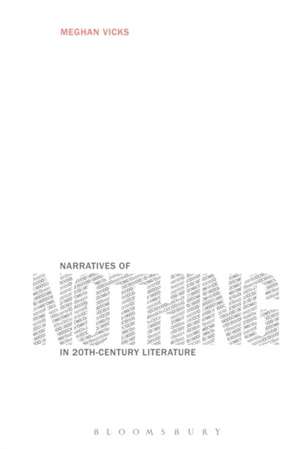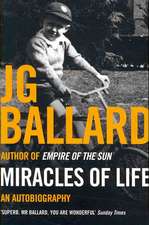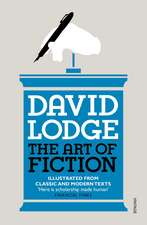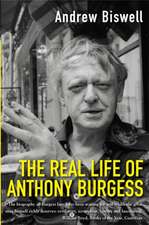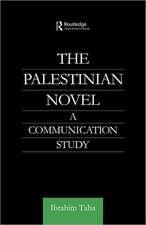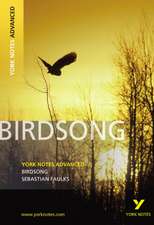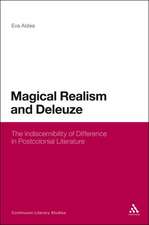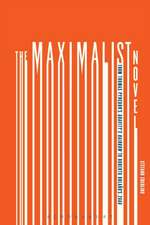Narratives of Nothing in 20th-Century Literature
Autor Dr. Meghan Vicksen Limba Engleză Paperback – 19 apr 2017
| Toate formatele și edițiile | Preț | Express |
|---|---|---|
| Paperback (1) | 255.94 lei 6-8 săpt. | |
| Bloomsbury Publishing – 19 apr 2017 | 255.94 lei 6-8 săpt. | |
| Hardback (1) | 772.49 lei 6-8 săpt. | |
| Bloomsbury Publishing – 21 oct 2015 | 772.49 lei 6-8 săpt. |
Preț: 255.94 lei
Nou
Puncte Express: 384
Preț estimativ în valută:
48.97€ • 51.26$ • 40.76£
48.97€ • 51.26$ • 40.76£
Carte tipărită la comandă
Livrare economică 31 martie-14 aprilie
Preluare comenzi: 021 569.72.76
Specificații
ISBN-13: 9781501331961
ISBN-10: 1501331965
Pagini: 208
Dimensiuni: 152 x 229 x 14 mm
Greutate: 0.29 kg
Ediția:NIPPOD
Editura: Bloomsbury Publishing
Colecția Bloomsbury Academic
Locul publicării:New York, United States
ISBN-10: 1501331965
Pagini: 208
Dimensiuni: 152 x 229 x 14 mm
Greutate: 0.29 kg
Ediția:NIPPOD
Editura: Bloomsbury Publishing
Colecția Bloomsbury Academic
Locul publicării:New York, United States
Caracteristici
New in-depth literary analyses on the work of three of the most widely-studied authors of 20-century literature: Vladimir Nabokov, Samuel Beckett, and Victor Pelevin
Notă biografică
Meghan Vicks is an independent scholar in Boston, Massachusetts, USA.
Cuprins
AcknowledgmentsChapter Zero: Introduction: Nothing and the Twentieth CenturyOdysseus : OutisKhôra : Socrates : Knowing NothingMuch Ado About NothingNarratives of NothingChapter One: Theorizing NothingZeroNothing and Being: Heidegger and SartreNothing and Narrative: Nietzsche, Derrida, Bakhtin, and KristevaChapter Two: Akaky Akakievich and BartlebyAkaky AkakievichBartlebyChapter Three: "Working in a Void": Vladimir Nabokov and the Semiotics of NothingMuzhiks Working in a VoidThe Otherworld and LossThe Real Life of Sebastian Knight: Reality as Nothing and the Aesthetics of Failure"Signs and Symbols": Patterning and NothingChapter Four: Samuel Beckett: Immanence, Language, NothingNothing happens, more than onceCritical Approaches to Beckett and NothingAesthetics of LessnessBeckettian ImmanenceMolloy: Questing ImmanenceAesthetics of Immanent NothingChapter Five: Victor Pelevin's Void and the Post-Soviet ConditionPelevin's PostmodernismEngineering the Human SoulPelevin's Divine Absurdity: The VoidNihilistic Nothing in Generation "P"Sacred Nothing in Chapaev and Void and The Sacred Book of the WerewolfConclusion: Nothing as the Transcendental SignifiedBibliographyIndex
Recenzii
Vicks has chosen a remarkable topic, one which is paradoxically brilliant, obvious, and understudied: nothing. What Vicks identifies as 'narratives of nothing' intrinsically presents epistemological and interpretive challenges: narration would seem to be 'about something' by definition. Yet Vicks shows just how much of a something 'nothing' has been for modern literature. By combining the usual suspects (Beckett, Sartre, Derrida, Kristeva) with key Russian figures (Gogol, Nabokov, and Pelevin), Vicks demonstrates not only for the centrality of 'nothing' as a Russian transcendental signifier over time, but also the centrality of Russia for the construction of 'nothing.'
Meghan Vicks situates three of the most innovative, controversial and influential figures of twentieth-century literature at the heart of her investigation of 'nothingness' in Western culture and thought. Through her insightful comparison of key texts, she casts new light on the work of Nabokov, Beckett and Pelevin, whilst establishing the 'void' as a critical element in their explorations of the human predicament.
In this well-written, deeply theorized study of the concept of nothing and its importance for fiction, Vicks (Germanic and Slavic languages, Univ. of Colorado, Boulder) traces the significance of nothingness through a multifaceted, interdisciplinary account that ranges from philosophy and mathematics to psychology and narrative theory. . Vicks presents a rejection of nihilism in favor of deeply humanist readings, making this a rewarding journey through key texts and ideas of the 20th century. Summing Up: Highly recommended. Graduate students, researchers, faculty.
Meghan Vicks situates three of the most innovative, controversial and influential figures of twentieth-century literature at the heart of her investigation of 'nothingness' in Western culture and thought. Through her insightful comparison of key texts, she casts new light on the work of Nabokov, Beckett and Pelevin, whilst establishing the 'void' as a critical element in their explorations of the human predicament.
In this well-written, deeply theorized study of the concept of nothing and its importance for fiction, Vicks (Germanic and Slavic languages, Univ. of Colorado, Boulder) traces the significance of nothingness through a multifaceted, interdisciplinary account that ranges from philosophy and mathematics to psychology and narrative theory. . Vicks presents a rejection of nihilism in favor of deeply humanist readings, making this a rewarding journey through key texts and ideas of the 20th century. Summing Up: Highly recommended. Graduate students, researchers, faculty.
